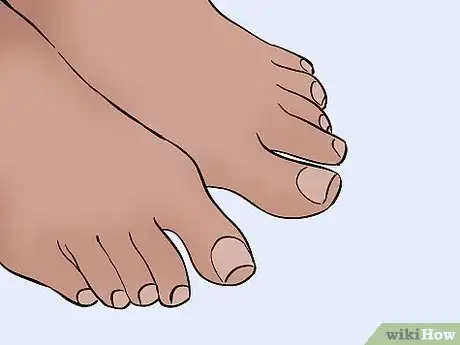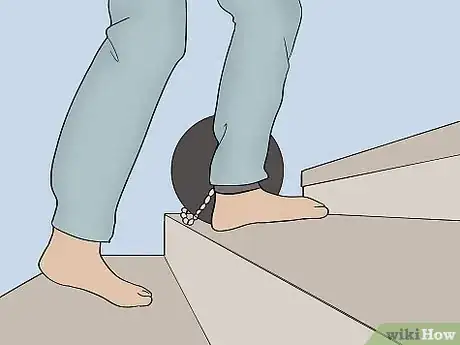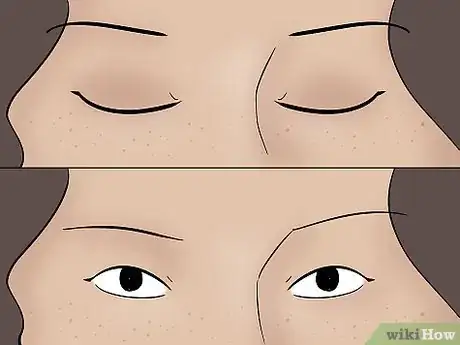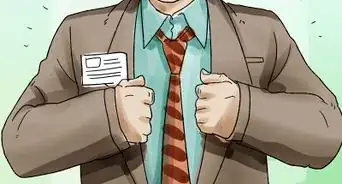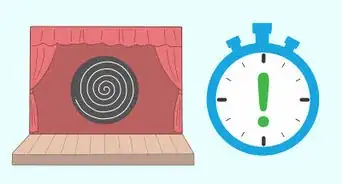This article was co-authored by Stephanie Riseley, MFA. Stephanie Riseley is a Hypnotherapist, Life, and Spiritual Coach based in Los Angeles, California. Stephanie merges neuroscience with spirituality to help people discover their own power and their soul purpose. Certified in Past Life Regression Therapy by the psychiatrist, Brian Weiss, MD, and the Brian Weiss Institute, she also uses Cognitive Behavior Modification and Awareness Therapy to help people heal. With over 30 years of experience, Stephanie conducted research for the DSM III (R), the manual of psychiatric disorders, at UCLA's Neuropsychiatric Institute. She earned a BA from the University of California, Berkeley, and an MFA from the University of California, Los Angeles.
There are 8 references cited in this article, which can be found at the bottom of the page.
wikiHow marks an article as reader-approved once it receives enough positive feedback. This article received 39 testimonials and 92% of readers who voted found it helpful, earning it our reader-approved status.
This article has been viewed 3,552,594 times.
Self-hypnosis is a naturally occurring state of mind which can be defined as a heightened state of focused concentration. With it, you can change your thinking, kick bad habits, and take control of the person you are—along with relaxation and destressing from everyday life. It's similar to meditation and results in a better you.
Steps
Preparing for Hypnosis
-
1Get into comfortable clothing. It's pretty hard entering any kind of deep, relaxed state when all you can think about is the waistband of your jeans cutting off your circulation. So take this as an excuse to throw on some sweats. You want absolutely nothing distracting you.[1]
- Make sure the temperature is good, too. Have a blanket or a sweater ready if you run on the chilly side. Sometimes feeling warm can be very comforting, too.
-
2Go to a quiet room and sit in any comfortable chair, couch, or bed.[2] Although some people prefer to lie down, you are more susceptible to sleep than when sitting up. Whether you sit or lie, ensure that you do not cross your legs or any part of your body. You may be in this position for a while and this could end up being uncomfortable.Advertisement
-
3Make sure you are not going to be disturbed for at least half an hour. No self-hypnosis is effective if it gets interrupted by a phone call, a pet, or a kid. Turn off your phone (and the alerts), lock the door, and sequester yourself. This is you time.
- The amount of time you want to dedicate to this is up to you. Most prefer to be in a trance (we try to avoid that phrase as it has certain...err...negative connotations) for about 15 or 20 minutes, but you should also allow time to get in and out of it, too.
-
4Figure out your hypnosis goals. Are you doing it just to relax? For self-improvement? To train your brain? If you're doing it to achieve a greater end (weight loss, quitting smoking, etc.), prepare a list of affirmations. Self-hypnosis can be used just for relaxation, sure, but it can be for a number of life-enhancing things, too.[3] Many use it to achieve their goals, change their thinking, or just as general positive reinforcement or motivation. Here are some examples of affirmations you could try:
- If you want to quit a bad habit, something to the point is the most effective. Think along the lines of, "I choose no longer to smoke. Cigarettes have no appeal to me."
- If you want to think more positively, aim for something like, "I am capable of whatever I set my mind to. I am in control and I am valuable."
- If you want to reach a specific goal, like weight loss, say it in the present tense: "I am eating healthy. I am losing my excess weight. My clothes feel better and I feel better."
- These are statements you will be reciting to yourself when you're under. Again, it's up to you, but many find them life-affirming and effective.
Entering Hypnosis
-
1Close your eyes and work to rid your mind of any feelings of fear, stress, or anxiety. When you begin, you might find it difficult not to think. You may find that thoughts keep intruding. When this happens, don't try to force the thoughts out. Observe them impartially, and then let them slip away. See How to Meditate for more help with this step.[4]
- Alternatively, some like to pick a point on the wall and focus on it. It could be the corner, it could be a smudge, it could be wherever you want it to be. Focus on the point, concentrating on your eyelids. Repeat to yourself that they're getting heavier and heavier and let them close when you cannot keep them open anymore.
-
2Recognize the tension in your body. Beginning with your toes, imagine the tension slowly falling away from your body and vanishing. Imagine it freeing each body part one at a time starting with your toes and working its way up your body. Visualize each part of your body becoming lighter and lighter as the tension is removed.
- Relax your toes, then your feet. Continue with your calves, thighs, hips, stomach and so on, until you've relaxed each portion, including your face and head. Using imagery techniques of something you find comforting or soothing, such as water (feel the water rushing over your feet and ankles, cleansing them of tension) can be effective as well.
-
3Take slow, deep breaths. When you exhale, see the tension and negativity leaving in a dark cloud. As you inhale, see the air returning as a bright force filled with life and energy.
- At this point, you can use visualization as you so choose. Think of a lemon and cut it in half in your mind. Imagine the juices oozing out and getting over your fingers. Place it in your mouth. What's your reaction? How does it feel, taste, and smell? Then, move onto more meaningful visions. Imagine your bills blowing away in the breeze. Imagine you running off those pounds. Get as detailed as possible. Always think of your five senses.
-
4Appreciate the fact that you are now extremely relaxed. Imagine you are at the top of a flight of 10 stairs which at the fifth step start to submerge into water. Picture every detail of this scene from the top to the bottom. Tell yourself that you are going to descend the stairs, counting each step down, starting at 10. Picture each number in your mind. Imagine that each number you count is further down and one step closer to the bottom. After each number, you will feel yourself drifting further and further into deep relaxation.[5]
- As you take each step, imagine the feel of the step under your feet. Once you are at the fifth step imagine and truly feel the refreshing coolness of the water and tell yourself that you are stepping into an oasis of purity and cleanliness. As you begin to descend the last five steps, start to feel the water getting higher and higher up your body. You should now start to feel somewhat numb and your heart will start to race a bit, but notice it and let any qualms about the situation just drift away into the water.
-
5Feel a floating sensation. At this point at the bottom of the water you shouldn't really feel anything, just the sensation of floating freely. You may even feel like you're spinning. If you do not feel as stated above, try again, slower with a will to grasp what is happening. Once you have achieved this state you should proceed to address your problems and decide upon what it is you want from where you are.
- Now start to narrate what you are doing; speak in the present and future tense quietly to yourself, or as if you are reading it from a page.
- Start to picture three boxes under the water that you have to swim to get to. Once you have found the boxes, open them slowly, one at a time, and narrate to yourself what is happening when you open the box. For example, "As I open the box I feel a radiant light engulf me, I feel it becoming a part of me. This light is my new found confidence that I can never lose as it is now a part of me" and then proceed on to the next box.
- You should avoid using statements with a negative connotation, such as "I don't want to be tired and irritable." Instead, say, "I am becoming calm and relaxed." Examples of positive statements include: "I am strong and slender," "I am successful and positive," and, if you have pain, "My back is beginning to feel wonderful." (See warning on pain.)
-
6Repeat your statement(s) to yourself as many times as you wish. Feel free to wander about the water, visualizing yourself emptying boxes, finding treasure (in the form of self-confidence, money, etc.), or simply letting all your tensions disappear. Find areas where the water is cold, hot, or full of wildlife. Let your imagination go.
-
7Get ready to exit your hypnotic state. With each step you take, feel the water becoming lower and lower until you have once again reached that fifth step. Once you are out of the water and are on the sixth step you may start to feel heavy or as if there is a weight on your chest. Merely wait on the step until this passes, constantly repeating your aforementioned statements.[6]
- Once it passes, continue up the stairs, visualizing each step by its number, feeling the steps underneath you. Will yourself to carry on up the stairs.
- For the record, this water visualization isn't 100% hard and true. If you come up with another scenario that you prefer, use it! It's just as good, if not better, since it works for you.
- Once it passes, continue up the stairs, visualizing each step by its number, feeling the steps underneath you. Will yourself to carry on up the stairs.
-
8Once you have ascended, give yourself a few moments before opening your eyes. You may want to visualize yourself opening a door to the outside world. Do this slowly and imagine the light that pours in through the doorway; this should make your eyes open naturally. If you need to, count down from ten, telling yourself that once you finish, your eyes will open.
- Take your time getting up. Then tell yourself, "Wide awake, wide awake," or something you're used to, in order to wake up. This will put your mind back in the conscious state, bringing you back to reality.
Enhancing Your Experience
-
1Mean it. No self-hypnosis or mantra will manifest itself in real life if you don't actually mean it. In order for this to be effective, you have to believe in yourself and your actions. And why not? If you do mean it, it could work.[7]
- If the first time doesn't seem effective, don't write it off automatically. Some things take time to get used to and to get good at. Come back to it in a few days and revisit the experiences. You may be surprised.
- Open your mind. You have to believe there is a possibility of this working in order for it to work. Any skepticism on your part will impede your progress.
-
2Test yourself physically. If you need proof you're in a trance, there are exercises you can do! Anything that can be seen or felt in your body can work. Try these ideas on for size:
- Entwine your fingers together. Keep them together throughout your trance, telling yourself that they are stuck together -- almost as if they're covered in glue. Then, try to take them apart. If you find you can't...proof!
- Think of one arm getting heavier and heavier. You don't need to consciously pick one; your brain will do this for you. Imagine a book on top of it, holding it down. Then, try to lift it up. Can you?
-
3Visualize situations. Whatever it is you're working toward -- be it confidence, weight loss, positive thinking, whatever -- visualize yourself in the situation acting as you'd like to react or being as you'd like to be. If you want to be thinner, imagine yourself sliding into your skinny jeans with ease, modeling in the mirror, smiling at your beautiful body. The endorphin rush alone will be worth it!
- Many use hypnosis to get over certain issues like shyness. You don't have to attack the shyness head on; something related will do. Simply imagining yourself going about the world with your head high, smiling, and making eye contact can be the first step toward a more extroverted you.
-
4Use outside things to assist you. In other words, some people like music to help them enter hypnosis. There are a bunch of hypnosis tracks available online that are just for this purpose. If a certain scene -- water, the rainforest, etc. -- would help, you have it at your fingertips![8]
- Timers can be helpful, too. Some find that getting out of the trance is difficult and they lose track of time. If you don't want to accidentally spend hours hypnotized, you can use a timer. Just make sure it has a soothing tone to get you out of it.
-
5Use it to better yourself. Find a goal of yours you'd like to achieve and concentrate on it during your relaxed state. Think of the person you'd like to be and be that person. Hypnosis is great for a deep, deep meditation, but it's better in that it can be used for a bigger, better purpose. Many people find that they emerge more positive and with a sense of purpose afterward. Take advantage of that possibility!
- There is no wrong way to go about this. Whether it's kicking a bad habit, having focus in your work life, or just changing your thinking, hypnosis can help. Getting rid of the stressors in your life is an integral part of being the person you want to become and this will help. And the more you do it, the better and more natural it'll feel.
Warnings
- Hypnosis does not always work immediately; you may need to repeat it often (e.g. every day for a month or more) to see the benefits. You will need to "train" yourself with lots of practice.⧼thumbs_response⧽
- Be careful when rising if you've been lying down. Getting up too quickly could cause your blood pressure to plummet, and you could easily become dizzy or pass out. (This has nothing to do with hypnosis, it is orthostatic hypotension.)⧼thumbs_response⧽
Things You'll Need
- A comfortable place to sit or lie down. Subdued lighting and the correct room temperature.
- A quiet environment where you will not be disturbed for at least half an hour.
References
- ↑ Stephanie Riseley, MFA. Certified Hypnotherapist. Expert Interview. 28 April 2020.
- ↑ Stephanie Riseley, MFA. Certified Hypnotherapist. Expert Interview. 28 April 2020.
- ↑ Stephanie Riseley, MFA. Certified Hypnotherapist. Expert Interview. 28 April 2020.
- ↑ https://www.csn.edu/sites/default/files/documents/relaxation_techniques_1.pdf
- ↑ https://www.fammed.wisc.edu/files/webfm-uploads/documents/outreach/im/handout_self_hypnosis_balloon_patient.pdf
- ↑ https://britishhypnosisresearch.com/hypnosis-techniques/
- ↑ https://healthy.kaiserpermanente.org/georgia/health-wellness/health-encyclopedia/he.aa119292spec
- ↑ https://silenciomusic.co.uk/background-music-for-hypnotherapy-an-essential-guide
- ↑ https://www.nhs.uk/conditions/hypnotherapy/
About This Article
To perform self hypnosis, start by settling in a comfortable chair or bed in a quiet room where you won’t be disturbed. When you’re ready to start, close your eyes and meditate by watching your thoughts and emotions come and go. Take slow, deep breaths to help you relax. Once you feel yourself getting calmer, imagine the tension melting away from your body, starting with your toes and working up to your head. If you have a purpose in mind for your self hypnosis, use visualization to help you address it. For example, if you want to reduce stress about your finances, imagine your bills drifting away in the wind. Stay with the image for as long as feels natural before letting it go. When you’re ready to end the session, imagine slowly opening a door and light pouring through the doorway to help you come around. For more tips, including how to use self hypnosis for personal development, read on!






